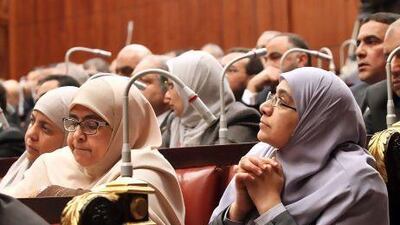CAIRO // Egypt's new constitution has been called the beginning of a repressive Islamist state, the greatest constitution in the country's history and a middling document unworthy of the uprising that unseated Hosni Mubarak.
It may turn out to be none of these things, but it does set the outlines for the power and legal struggles to come as Egypt forges a new democratic path.
Enshrining in the legal system a role for Al Azhar, the 1,000-year-old mosque and university and Sunni Islam's highest authority, could be the most important change of all.
Judges and politicians - and before them, kings and rulers - have sought the advice of Al Azhar's scholars for centuries, but the new constitution lays out changes to the institution in the greatest detail yet. It both guarantees Al Azhar independence over its affairs and gives it a consultative role in determining if new laws are compliant with sharia.
Secularists and liberals fear Al Azhar's influence, but the organisation has a more conservative view. Sheikh Mohamed Gemeaha, Al Azhar's spokesman, said the institution's age-old role is simply spelled out for the first time.
"We are proud of achieving independence in the new constitution," he said. "This is something we have wanted for a long time. But we have always consulted on matters of sharia. This is not something new."
Historically, the Supreme Constitutional Court (SCC) has consulted Al Azhar on Sharia, but it was not required to do so by law. The SCC took the view that the vast body of research and sometimes conflicting rulings that makes up Sharia only had a limited application in law. Areas such as inheritance were clear cut, in the view of the judges, but issues such as whether wearing a veil was a religious obligation were not.
"The constitution is not itself a battle field, but it is opening different battle fields that will have an impact on daily life in Egypt," said Georges Fahmi, a researcher at the non-profit group Arab Forum for Alternatives and an expert on how religious authorities in Egypt and Turkey support democracy.
A prime example of the SCC's stance toward Sharia came in the 1990s, when a father of two school girls sought to overturn a 1994 decree by the minister of education banning students from wearing the full face veil, or niqab. Awad El Murr, then president of the SCC, ruled that the decree did not interfere with the requirements of Islam.
"It would be impractical to regard as mandatory a phantom-like dress for women ... The Quran, along with the sayings of the Prophet do not portray women as figures hidden under a screen, draped from head-to-toe, with no part of their bodies except their eyes revealed, Judge El Murr wrote in his 1997 ruling.
The new constitution will make it difficult for the SCC to continue with this position especially as it is obligated now to consult first with Al Azhar on matters pertaining to Sharia, Mr Fahmi said.
A salient comparison comes from 1980, when the constitution was first amended to include "principles of Sharia" as the basis of legislation. Islamists at the time pushed for an extensive review of all laws for Sharia compliance. The president at the time, Anwar Sadat, and Mubarak, who became president in 1981 after Sadat's assassination, used their power to prevent that from happening.
"The Salafists will now use their seats in parliament to push for a review of all laws in the same way," Mr Fahmi said. "The question is will anyone stop them? Will the Brotherhood remain pragmatic or will they agree?"
The impact of such a review could be felt everywhere from the rights of divorced mothers and curriculum of schools to the government obtaining interest-bearing loans and funding of the arts.
Changes in Egypt may not come suddenly because Al Azhar's top officials have for now managed to avoid a full-on democracy within the institution itself.
Amid the uprising there were fears that Ahmed Al Tayyeb, the grand sheikh of Al Azhar, would be forced out because of his record of supporting the president.
Even when Mubarak was clinging onto power, Sheikh Al Tayyeb took the risk of being one of the first officials to call for reform. He did so, in part, because of his tenuous situation. Sheikh Al Tayyeb, a Mubarak-appointee and a member of the ruling National Democratic Party, was himself a target for his record of supporting the president as a wave of unrest gripped the country.
The grand sheikh went on to carve a moderate role for Al Azhar in the tumultuous political landscape after the uprising, establishing a document with support from across the political spectrum that guaranteed freedom of belief and expression.
The military generals who took over from Mubarak were also aware of the crucial role of Al Azhar. In a rushed decree before the first parliament was seated in January 2012, the Supreme Council of the Armed Forces issued a law that changed the system of choosing the Grand Sheikh. A council of senior scholars would elect him instead of allowing the president to appoint him, but it also allowed Sheikh Al Tayyeb to remain in place until death or senility. And he would be the one to appoint the council of senior scholars, guaranteeing that new religious currents could not change the temperament of Al Azhar for years to come.
But that law could be overturned or replaced in the new parliament. Al Azhar will remain independent because of the new constitution, but Sheikh Al Tayyeb's position is not guaranteed, analysts said.
One tool of those opposing him, including Salafists who want a more conservative leader for Al Azhar is Article 232 of the constitution which says "leaders of the dissolved National Democratic Party shall be banned from political work and prohibited to run for presidential or legislative elections for a period of 10 years".
Follow
The National
on
& Bradley Hope on

